六上英语Unit 4 B Let's talk 英汉对译
六年级上册英语u2课文翻译

六年级上册英语u2课文翻译六年级上册英语unit2课文:A部分Let’s talk课文以及翻译:Mike: Good morning, Mrs Smith!迈克:早上好,史密斯老师!Mrs Smith: Hi, children. You’re early. How do you come to school?史密斯老师:你们好,孩子们。
你们真早。
你们怎么来学校的?Amy: Usually, I come on foot. Sometimes I come by bus.埃米:通常,我走路来。
有时我乘公共汽车来。
Mike: I often come by bike.迈克:我经常骑自行车来。
Amy: How do you come to school, Mrs Smith? By car?埃米:你怎么来学校的,史密斯老师?乘小汽车吗?Mrs Smith: Sometimes, but I usually walk.史密斯老师:有时,但是我通常走路来。
Mike: That’s good exercise.迈克:那是很好的锻炼。
B部分Let’s talk课文以及翻译:Wu Binbin: Mr Jones, how can I get to the Fuxing Hospital?吴彬彬:琼斯先生,我怎么到复兴医院?Mr Jones: Take the No. 57 bus over there.琼斯先生:在那边乘57路公共汽车。
Wu Binbin: Thanks. Wow! So many pictures of bikes!吴彬彬:谢谢。
哇!这么多张自行车的照片!Mr Jones: They’re from my cousin in the USA.琼斯先生:它们来自我在美国的表哥。
Wu Binbin: What’s this?吴彬彬:这是什么?Mr Jones: A helmet. In the USA people on bikes must wear one.琼斯先生:一个头盔。
人教PEP六年级上册英语《 Unit 4 Part B Let's try-Let's talk 》
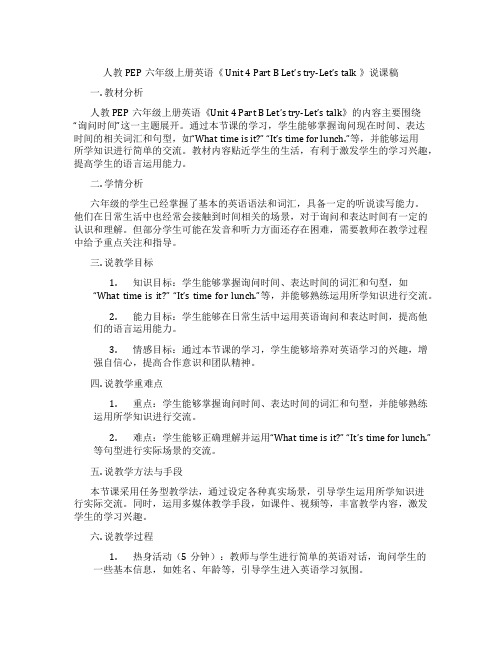
人教PEP六年级上册英语《Unit 4 Part B Let’s try-Let’s talk 》说课稿一. 教材分析人教PEP六年级上册英语《Unit 4 Part B Let’s try-Let’s talk》的内容主要围绕“询问时间”这一主题展开。
通过本节课的学习,学生能够掌握询问现在时间、表达时间的相关词汇和句型,如“What time is it?” “It’s time for lunch.”等,并能够运用所学知识进行简单的交流。
教材内容贴近学生的生活,有利于激发学生的学习兴趣,提高学生的语言运用能力。
二. 学情分析六年级的学生已经掌握了基本的英语语法和词汇,具备一定的听说读写能力。
他们在日常生活中也经常会接触到时间相关的场景,对于询问和表达时间有一定的认识和理解。
但部分学生可能在发音和听力方面还存在困难,需要教师在教学过程中给予重点关注和指导。
三. 说教学目标1.知识目标:学生能够掌握询问时间、表达时间的词汇和句型,如“What time is it?” “It’s time for lunch.”等,并能够熟练运用所学知识进行交流。
2.能力目标:学生能够在日常生活中运用英语询问和表达时间,提高他们的语言运用能力。
3.情感目标:通过本节课的学习,学生能够培养对英语学习的兴趣,增强自信心,提高合作意识和团队精神。
四. 说教学重难点1.重点:学生能够掌握询问时间、表达时间的词汇和句型,并能够熟练运用所学知识进行交流。
2.难点:学生能够正确理解并运用“What time is it?” “It’s time for lunch.”等句型进行实际场景的交流。
五. 说教学方法与手段本节课采用任务型教学法,通过设定各种真实场景,引导学生运用所学知识进行实际交流。
同时,运用多媒体教学手段,如课件、视频等,丰富教学内容,激发学生的学习兴趣。
六. 说教学过程1.热身活动(5分钟):教师与学生进行简单的英语对话,询问学生的一些基本信息,如姓名、年龄等,引导学生进入英语学习氛围。
新pep英语六年级上册unit4-IhaveapenpalBLet's-talk
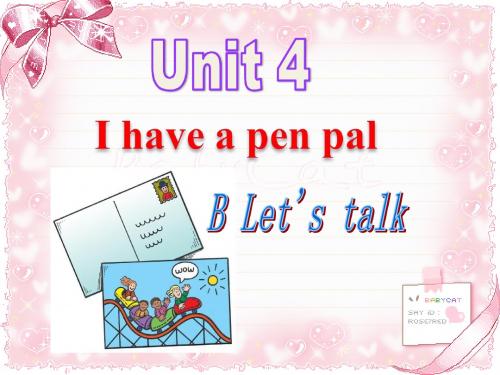
Wu Yifan: Sure. Why not?
Part B let’s talk
Yes or No?
Wu Yifan’s new pen pal’s name is John. He lives in Sydney. He lives in Caning word puzzles and going hiking. John likes doing word puzzles and going Amazing! I like those too! hiking too.
Does he study Chinese?
This is my new pen pal. He lives in Australia. I have a new pen pal in Australia.
What are you doing?
I'm writing an email to my new penpal in Australia.
•
A 1._____Amy like dancing? Yes, she does. A. Does B. Do B 2. _____you like singing? Yes, I do. A. Does B. Do A 3. John _____doing kung fu. A.likes B . Like 4. Does your pen pal ___in Canada? B No, he doesn’t. He _____in Canberra. A. Lives ,lives B. live ,lives
Amazing! I like those too. (令人惊奇的)
doing word puzzles
六年级上册英语第四单元B Let's talk
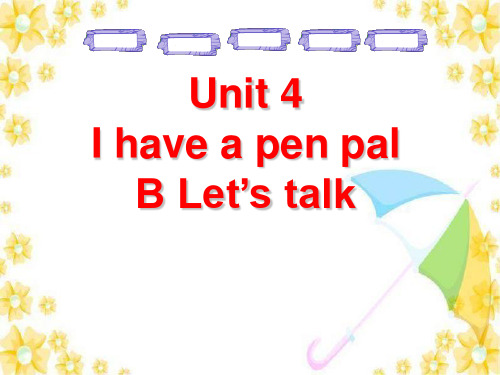
Does he live in Sydney?
No, he doesn’t. He lives in Canberra, Australia.
堪培拉
(澳大利亚首都)
Does he study Chinese?
Yes, he does.
He cooks Chinese food, too.
Does he like doing word puzzles and going hikinge those too!
惊奇的
Can I also be his pen pal?
Sure . Why not?
• He likes doing word puzzles.改为疑问句。
• Does he like doing word puzzles? – Yes ,he does./No,he doesn't.
• Does he live in Canberra?
绿色圃中小学教育网
绿色圃中小学教育网
绿色圃中小学教育网
绿色圃中小学教育网
can 与be 动词用法相同,可以直接提 句首变疑问句,can后+not变否定句。 Can you swim?Yes,I can. No, I can't.
口头读翻译:
1.她喜欢去游泳吗?
2.你正在干什么?
3.他居住在中国。 4.Lucy 喜欢做中国菜。 5.这个女孩每天学习语文。
找出下列句子的正确答语。
• 改为肯定句: 先去does后接三单。
He lives in Canberra.
can的用法
can:可以,能,会。后+动词原形。
I can dance. She can do Chinese kung fu. He can read stories. We can play football. Lucy can do word puzzles.
let'stalk翻译中文
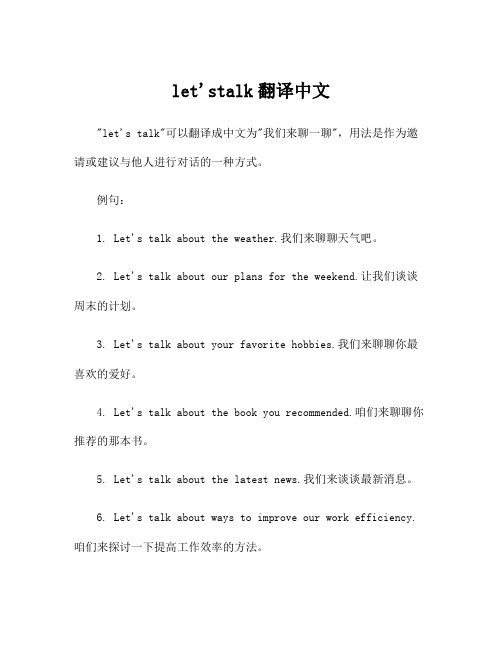
let'stalk翻译中文
"let's talk"可以翻译成中文为"我们来聊一聊",用法是作为邀请或建议与他人进行对话的一种方式。
例句:
1. Let's talk about the weather.我们来聊聊天气吧。
2. Let's talk about our plans for the weekend.让我们谈谈周末的计划。
3. Let's talk about your favorite hobbies.我们来聊聊你最喜欢的爱好。
4. Let's talk about the book you recommended.咱们来聊聊你推荐的那本书。
5. Let's talk about the latest news.我们来谈谈最新消息。
6. Let's talk about ways to improve our work efficiency.咱们来探讨一下提高工作效率的方法。
7. Let's talk about the differences between our cultures.咱们来聊聊我们文化之间的差异。
8. Let's talk about our favorite movies.让我们谈谈我们最喜欢的电影。
9. Let's talk about the challenges we are facing.让我们讨论一下我们面临的挑战。
10. Let's talk about our dreams and aspirations.我们来聊聊我们的梦想和志向。
人教版六年级上册英语-Unit 4 BLet's talk
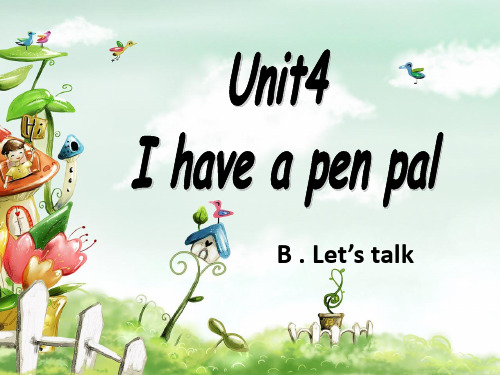
Hobbies: doing word puzzles and going hiking.
do word puzzles
r
f r i e nd
o
a
a
o
d
n
t
c
b
e
a
l
l
How do you know that?
Give me the key sentences in the dialouge.
Does he live in Sydney? No, he doesn't.
I like those too.
Tallk and guess. Look! I have a pen pal.
Does he/she live in…?
Let's be pen pals.
Does he/she like…?
Yes,he/she does. No,he/she doesn’t.
流利、清楚。
: ___________.3. Act it out with emotion.
富有情感和动作。
: _______! I like those too! Can I also be his pen pal?
: Sure. Why not?
: Cool!
My pen pal.
My pen pal
John,你想知道Wu Yifan笔友的哪些信息?)
Watch and find.
Name: Hobbies:
City:
Watch and find.
Name: John City: Canberra Hobbies:
悉尼
澳大利亚首都堪培拉
英语人教版六年级上册Unit4 Part B Let's talk
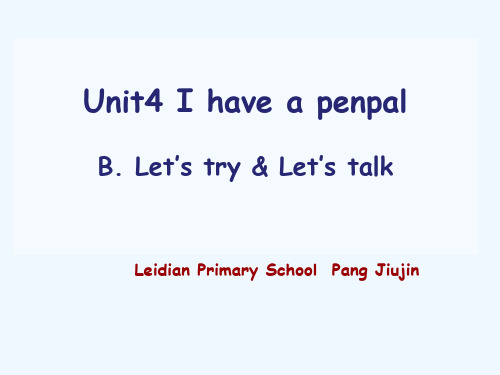
AWushterarleia
Name
Cacnitbyerra
He likes doing worhdobpbuyzzles and going hiking.
仔细听,重点体会连读、重音,再模仿。
. John: Hey,Yifan.What are you doing? . . . Wu Yifan:I’m writing an email to my new penpal in Austrlia.
11Hyoewarosldold
AWushterarleia
Name John
Cacnitbyerra
He likes doing worhdobpbuyzzles and going hiking.
Do you want to be John’s penpal?
John:Does he live in Sydney?
. Wu Yifan:No, he doesn’t.He lives in Canberra.His name is John,too. . . John: Really?Does he like doing word puzzles
and goinagmhiakzineg-?----amazing
. John:Amazing! I like those,too!Can I also be his penpal? . . Wu Yifan:Sure .Why not?
. . John:Cool! What do the two Johns like?
Information about the penpal
www.penpal .com
W 你H趣想e)h知lla道oti他,n什dI么’oCm信hyi息aon呢au?b.owCyaa.nnI’tymotuovebkrenyomiwyntpaeebrnoepusattle?hd(im感?兴
人教版小学六年级英语上册unit4 let's talk

Kite show Time:Saturday
Painting Time:Sunday
Bike show Time:Saturday
I like drawing pictures.
Chen Jie likes drawing pictures.I like playing football.
Chen Jie likes drawing pictures.Mike likes playing football. I like ....
Wu:What’s your hobby? John:I like collecting stamps.What about you? Wu:Me too.There is a stamp show on Sunday. Let’s go together. John:I have a friend.He likes collecting stamps, too.Can he go with us? Wu:Sure!Leabharlann 1A √B
√
A
2
B
Tape scripts(录音原文)
A:Look!This is Bill.He is from the UK .He likes playing football.This is Daniel.He is a university student.He’s tall and srong.He likes diving. B:Circle their hobbies.
What’s your hobby? I like collecting stamps. He likes collecting stamps,too.
likes是like的第三人称单数形式,如果 表示“他或她喜欢做……”用 “He/She likes ....” likes后面接动词的-ing形式 如:He likes diving. She likes making kites. Sarah likes riding a bike. John likes playing football. His mom likes singing.
